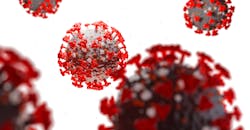Medical companies around the globe are scrambling to design and produce vaccines and treatments for eliminating the virus. Two companies, Pfizer and BioNTech, announced today that their vaccine candidates had secured approval for human testing in Germany. Other medical manufacturers are focused on creating tests that can identify how widespread the virus actually is. According to Roche CEO Severin Schwan, whose company is almost ready to release its own antibody test, many of the tests on the market are unsatisfactory.
“It’s a disaster,” he said. “These tests are not worth anything, or have very little use,” Schwan told reporters on a conference call.
That’s troublesome, because almost every official plan for reopening the country calls for increased testing. President Trump’s “Opening Up America Again” plan, for example, relies on states employing tests to evaluate whether or not the gradual lifting of social-distancing policies over the course of three phases is working or backsliding.
Amid the governmental struggle to acquire and distribute functional tests, manufacturers around the country continue to cope as well as they can. Here’s some of what manufacturers are doing to survive and thrive during the COVID-19 pandemic.
Daimler, Volvo Trucks Form JV to Research and Develop Fuel Cells
Two transport vehicle manufacturers, Daimler AG and Volvo Trucks, announced today they would be collaborating on a joint venture to research and develop hydrogen fuel sources for long-haul trucks. Volvo will pay $650 million for a 50% stake in the enterprise, while Daimler will contribute all of its existing fuel-cell work as well as manufacturing locations associated with its Mercedes-Benz Fuel Cell company. According to the Center for Automotive Research, traditional vehicle manufacturers might respond to the dual pressures of the coronavirus and rapidly changing automotive technology by collaborating on R&D more. Read the full story here.
Adjusting to the New Norm: MSC Implementing Computer-Aided Engineering
The coronavirus has pushed employers in every sector to begin implementing more work-from-home measures as they practice social distancing by emptying nonessential offices. MSC, a software company that specializes in simulation software, reports that demand for their programs has leaped as engineers and product designers seek to develop and test product lines remotely. Read the full story here.
How Manufacturers Are Helping
The case of manufacturers successfully pivoting to producing critically-needed protective equipment and medical gear is one of intelligent management and agile networking. Shirish Pareek, for his part, founded the Manufacturing Coalition in order to bring together a vast number of American business leaders from the Young President’s Organization in order to facilitate manufacturers changing their products temporarily to produce masks, gloves, hand sanitizer, and ventilators. Read the full story here.
According to Ted Stank, faculty director of the Global Supply Chain Institute, manufacturers who manage to successfully pivot to producing PPE and other coronavirus-related products outside their usual wheelhouse have a few things in common. First, convertible materials, but secondly, and possibly more importantly, innovation. Read the full story here.
About the Author
Ryan Secard
Associate Editor
Ryan Secard joined Endeavor B2B in 2020 as a news editor for IndustryWeek. He currently contributes to IW, American Machinist, Foundry Management & Technology, and Plant Services on breaking manufacturing news, new products, plant openings and closures, and labor issues in manufacturing.
